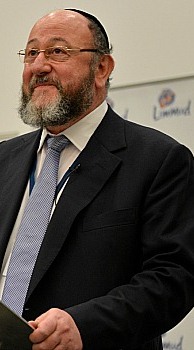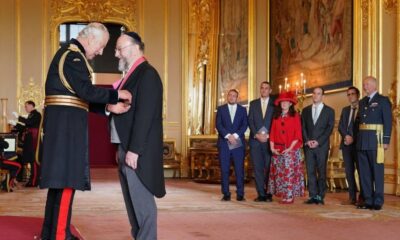
Religion

Mirvis decries ‘self-Imposed ghetto’ at Limmud debut
ANT KATZ
“I’m delighted to be part of this”
By: Ant Katz with the Jerusalem Post and the Jewish Daily Forward
British Chief Rabbi Ephraim Mirvis brought a message of openness to Limmud this week. In keeping principle of not elevating any speaker, organisers did not introduce Mirvis as he took the podium. He said that he was moved by the acts of voluntarism he had witnessed. “Here at Limmud, you can’t escape the fact that it’s great to be Jewish and I’m delighted to be a part of this,” he said, smiling broadly.
 In the decades since a bunch of British Jews created Limmud, its model of volunteer experts offering a pluralistic smorgasbord of Jewish teachings, arts offerings and performances has turned into a worldwide movement. But through all these years, the Chief Rabbi of the United Kingdom has never attended Limmud in the country where it all started. In SA Orthodox Rabbis and Chief Rabbi Warren Goldstein also do not attend.So, just by his presence on Monday, Rabbi Mirvis, who has held the powerful position of Chief Rabbi for only a year, created a buzz in the UK – and in South Africa.
In the decades since a bunch of British Jews created Limmud, its model of volunteer experts offering a pluralistic smorgasbord of Jewish teachings, arts offerings and performances has turned into a worldwide movement. But through all these years, the Chief Rabbi of the United Kingdom has never attended Limmud in the country where it all started. In SA Orthodox Rabbis and Chief Rabbi Warren Goldstein also do not attend.So, just by his presence on Monday, Rabbi Mirvis, who has held the powerful position of Chief Rabbi for only a year, created a buzz in the UK – and in South Africa.
RIGHT: Rabbi Mirvis
seemed quite comfortable
at Limmud UK this week
Observers were well aware that the previous Chief Rabbi, Lord Jonathan Sacks, avoided attending Limmud, even when his own son-in-law helped run the multi-day conference, which attracts thousands of Jews to a windswept university campus in the middle of England.
No special treatment given
In keeping with its principle of not elevating any one speaker over another, Limmud organisers did not introduce Chief Rabbi Mirvis as he took the podium.
The JEWISH DAILY FORWARD said in an article this week that: “Limmud’s core principles of egalitarian openness were evidently too much for the leader of British Jews to countenance.”
The room in which Mirivs spoke was jam-packed with an eager audience and a phalanx of security. Many more listened in an overflow room.
What they heard on the surface was an engaging if conventional teaching about the Torah portion of the week – specifically, the second chapter of the book of Exodus, beginning with the birth of Moses.
But, said The Forward correspondent, the subtext was startling for its message: Mirvis used the figure of Moses not only to illuminate leadership qualities and to emphasize Jewish unity. He also forcefully spoke of the need for “universalistic ideals” and the imperative to be concerned about other people, to “not exist in a self-imposed ghetto away from the rest of the people in the world.”
“Pious but treif way of life”
“When we exist only for ourselves, when we disregard members of other communities…that might be a pious way of life but it is a treif way of life.”
“Mirvis may be new in his position, the only one dressed in a suit in this decidedly casual crowd, but my sense is that he knew exactly what he was doing by drawing that lesson in his maiden speech at Limmud,” wrote the Forward’s correspondent, “a movement that many say reflects his future constituency. This is a grey-haired conference, but also a hip and edgy one.
“He needs the allegiance of Limmudniks if he is going to be able to maintain the centrality of his office. British Jews are more moderate and affiliated than American Jews, but they are not immune to the opposing trends of fundamentalism and assimilation that are tearing away at the broad centre among their co-religionists across the pond.”
It’s great to be Jewish, I’m delighted to be part of this
Mirvis told the audience of several hundred that he was moved by the acts of voluntarism he had witnessed. “Here at Limmud, you can’t escape the fact that it’s great to be Jewish and I’m delighted to be a part of this,” he said, smiling broadly.
 Mirvis received a standing ovation upon entering the packed auditorium at the University of Warwick, wrote J-POST, and he did not directly address the controversy on his attendance – but contained himself to his lecture subject, this week’s Torah portion.
Mirvis received a standing ovation upon entering the packed auditorium at the University of Warwick, wrote J-POST, and he did not directly address the controversy on his attendance – but contained himself to his lecture subject, this week’s Torah portion.
LEFT: “We need to concentrate
seriously on binding the Jewish
people, rope like, together” – MIRVIS
Referring to Moses’ talent in drawing together the Jewish people, he suggested that single strands are easier to break than a rope.
“We need to concentrate seriously on binding the Jewish people, rope like, together,” the Cape Town born and bred Rabbi Mirvis said.
The Chief Rabbi also gave a second session on Tuesday entitled “A Torah guide to conflict resolution.”
Rabbi Mirvis has previously served as Chief Rabbi of Ireland, faced many Orthodox critics of Limmud which draws thousands of participants from all walks of Jewish life.
Orthodox authorities have previously felt that the annual conference represented a danger to British Jewry by suggesting it was acceptable for observant Jews to associate with less- or non-observant Jews.
This year’s annual event, the 30th in the UK, drew over 2,500 participants from the United Kingdom and around the world for 4 1/2 days of lectures, workshops, performances and discussions on Jewish issues ranging from Torah study to art, archaeology, history and politics. The event is more than 30 years old.
Walking a very fine line
Mirvis’ predecessor, Jonathan Sacks, reportedly had supported Limmud early on but bowed to pressure from his Charedi colleagues and never attended.
So Mirvis is walking a very fine line. And he has by no means shown a general tendency towards being a reformer. He recently angered feminists by dismissing the “partnership minyanim” that allow for more female participation in Orthodox prayer services.
But his appearance at Limmud will resonate, as will his words. The organisers and the audience clearly appreciated the legitimisation that his attendance gave to the movement.
From new Prince George to late Mandela
He was a forceful speaker, at times charming, moving fluidly from referencing the new Prince George, the late Nelson Mandela, Kabbalah and lots of traditional Jewish texts, to story-telling that left the audience laughing.
While his central message was a standard mix of hope and faith, he tucked a universalistic theme into many of his comments. Moses achieved greatness even though he came from humble beginnings; that is, we all have the capacity to be leaders.
Mirvis told the audience that they must be totally devoted to their fellow Jews, but that wasn’t enough. They also needed to be concerned about other people, “to reach out to all mankind.”











anon
December 26, 2013 at 2:42 pm
‘
\”It’s great to be Jewish\”
What’s so good about being Jewish in Chutz LaAretz (outside of Israel) where being Jewish is becoming more and more dangerous both physically and spiritually.
Surely Religious and lay leaders can see that Eretz Yisrael is the only place where it can be great to be Jewish.
‘